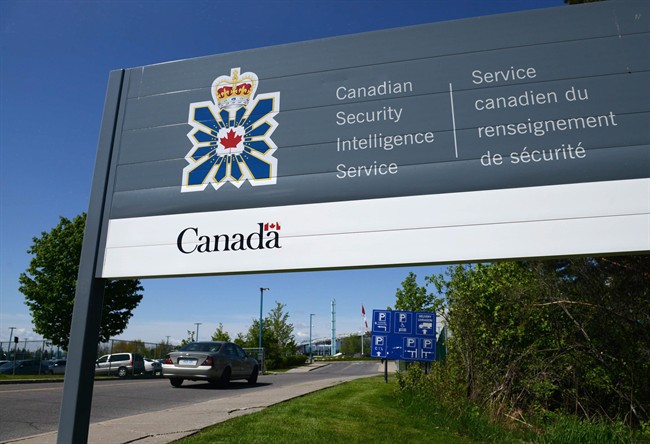OTTAWA – The Canadian Security Intelligence Service has set up a “multilateral forum of trusted partners” to share information on suspected extremists travelling abroad – a group that extends beyond its customary Five Eyes spy network, a newly released memo says.

In the memo, “CSIS Response: Addressing the Terrorist Travel Threat,” Canada’s spy agency also flags a concern about the challenges it faces in going further to build relationships with “non-traditional partners.”
READ MORE: Federal anti-terrorism bill changes not enough to satisfy concerns
The September CSIS memo evokes the kind of information-sharing that led to the overseas torture of four Arab-Canadians following the 9/11 attacks, said Alex Neve, secretary general of Amnesty International Canada.
“The very term ‘terrorist travel’ is uncertain and loaded,” Neve said. “Who, exactly, would be covered?”
The memo was drafted just weeks before a jihadi-inspired gunman fatally shot a soldier at the National War Memorial and stormed Parliament Hill last October.
Those events prompted introduction of sweeping new security legislation to crack down on homegrown extremists, including those intent on heading abroad to join foreign battles. The government has also brought in a bill that would give CSIS more latitude to obtain a court-ordered warrant authorizing security investigations in other countries.
CSIS fears extremists who head to Syria or Iraq may return to Canada to wage attacks.
The traveller phenomenon is a “priority collection” requirement for the spy service, the memo says.
“Obtaining the required intelligence on this threat to advise the Government requires extensive and resource-intensive investigations at home and abroad given the issue has both international and domestic components.”

Get breaking National news
A heavily censored copy of the five-page, top-secret memo was obtained by The Canadian Press under the Access to Information Act.
READ MORE: Federal anti-terror bill will spawn spy scandals due to poor oversight: paper
A full page of proposals “Under Development or Consideration” was withheld from release.
CSIS and Canada’s Five Eyes partners – the United States, Britain, Australia and New Zealand – routinely share intelligence on the terrorist travel phenomenon and specific individuals of interest, the memo says.
“In addition to Five-Eyes co-operation, Canada engages in regular intelligence sharing on this issue via a multilateral forum of trusted partners initiated by CSIS to address this issue.”
CSIS had no immediate answers to questions about the forum.
“Investigating and assessing terrorist travel requires close co-operation with allies, including non-traditional partners,” the document points out.
But it then goes on to warn: “Canada’s allies are strengthening a number of existing authorities and capabilities to respond to this threat” – in contrast to Canada, where “operational challenges and resource pressures are compounded” by factors that were scrubbed from the memo.
Sharing information with “non-traditional partners” substantially increases the risk of abuses, given the likelihood that many of those countries almost certainly have notorious human rights records, Neve said.
Similarly, the reference to regular information exchanges in a multilateral forum of trusted partners “raises questions and concerns about what is being shared, about whom and with which countries,” Neve said.
Maher Arar, a Syrian-born Canadian, was detained in New York in September 2002 and deported soon after by U.S. authorities – winding up in a Damascus prison. Under torture, he gave false confessions to Syrian military intelligence officers about involvement with al-Qaida.
READ MORE: CIA employees tried to stop arrest, torture of Maher Arar: former spy
A federal inquiry concluded that inaccurate information the RCMP passed to the United States very likely led to the Ottawa engineer’s year-long nightmare.
A subsequent inquiry headed by former Supreme Court judge Frank Iacobucci into the imprisonment of three other Arab-Canadian men during the same period found Canadian officials had a hand in their torture in Syria through the sharing of information with foreign intelligence and police agencies.
In one case, Canadian officials provided questions to Syrian military intelligence.
Even so, Neve noted, a 2011 directive from the public safety minister allows CSIS to share material with other countries even in circumstances that raise significant concerns about torture.
A decision on whether to share must be referred to the CSIS director when there is a substantial risk that sending information to – or soliciting information from – a foreign agency would cause harm to someone.
The spy service may soon have a wider array of intelligence at its fingertips because the main anti-terrorism bill before Parliament could make available all federally held information about someone of interest to as many as 17 government agencies – including CSIS – with national-security roles.
Neve said he might feel reassured if the Conservative government improved oversight of national security activities.
The government has consistently rejected the idea during debate of its proposed anti-terrorism measures, saying the existing Security Intelligence Review Committee, which keeps an eye on CSIS, is the envy of the world.







Comments